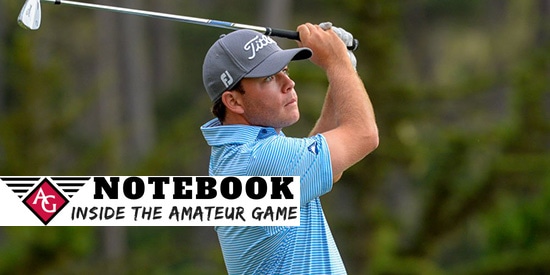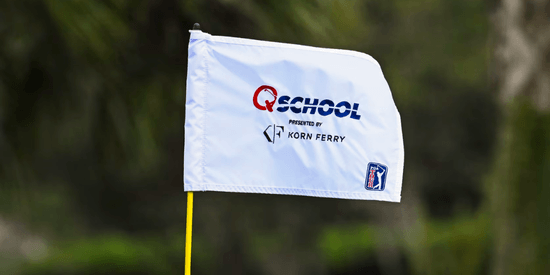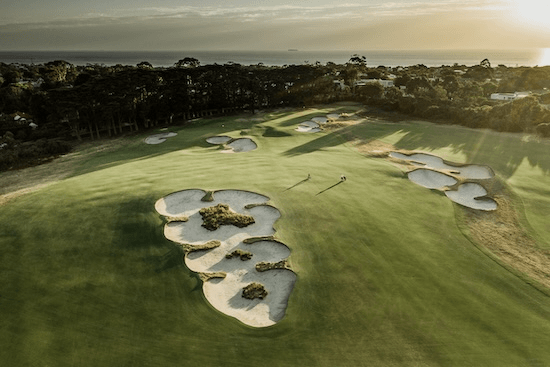Notebook: Alligood fights to find form; Lench's POY season
11/11/2018 | by Julie Williams of AmateurGolf.com
see also: Ka'anapali Collegiate Classic, Kaanapali Golf Resort

UNF's Andrew Alligood fought back high expectations after a U.S. Am breakthrough. Plus, Q&A with FSGA POY Gabe Lench.
“It was for sure something I was disappointed in myself for not stepping up and keeping that spot even though I wasn’t playing good golf at all at the time,” Alligood said at the end of the fall season.
Alligood has hardly experienced straight-line growth over the past few months. There have been plenty of highs and lows. A third-place finish in U.S. Amateur stroke play and wins in his first two matches was a sort of breakout for the local kid from Saint John’s, Fla. What followed was an obvious desire to prove that it hadn’t been just a career week.
In North Florida’s fall debut, the Carpet Capital Collegiate, Alligood came out of the gate with a 78. Real disaster struck in the next round, when he signed an incorrect scorecard and was disqualified. He was able to tee it up in the next round and came back with 2-under 70.
“I got there and probably had expectations a little too high coming off the U.S. Am instead of focusing on the process it takes to play well,” Alligood said. “I probably got a little focused on the wrong things.”
Alligood logged a round in the 80s at each of the Ospreys’ next two tournaments. It began a vicious cycle where he could never work out the kinks because he kept falling out of the lineup and having to play his way back in. By North Florida's fourth start, Alligood couldn’t get back in the lineup. His team played, and won, the Quail Valley Intercollegiate without him.
It was a blip in Alligood’s college career, and likely equal parts mental and physical.
“I think his golf swing wasn’t as good as he normally would have it,” said head coach Scott Schroeder. “In his college career, his adversity has been very small. It’s been a round here, a round there. This is the first time he’s been a couple weeks off and self-doubt creeps in. Getting back to where you want to be takes a couple weeks longer.”
There are no surprises in Schroeder’s program, and Alligood knew there’d also be no exceptions. So he committed the off-week to working out the kinks. The team’s final tournament would be in Hawaii, and Alligood being a senior, knew he was already slated into the lineup.
When the Ospreys edged South Florida by a shot that week, Alligood immediately sent a text to Schroeder, offering congratulations but also a joke: “I’ll just play individual in Hawaii since you don’t need me to win.”
Schroeder’s response? North Florida plays its best when you’re in the lineup.
“That refueled me a little bit and made me a little more excited to get back, get in the van and get back to competing with the guys,” Alligood said.
In three years, Alligood has hardly been traveling deadweight. He contributes mightily. Over his first three seasons, his score counted 85 percent of the time. That Alligood arrived in Hawaii, logged rounds of 69-63-70, finished fifth individually and led North Florida on a charge that left them just short of Cal, who rallied hard in the final round to win the Ka’anapali Classic.
And therein lies the most intriguing part of Alligood’s play. When he and fellow seniors Travis Trace and Philip Knowles get hot at the same time, good things happen – like the 18-under team score North Florida produced in the second round of the Ka’anapali event. It was the toughest scoring day, and the Ospreys outpaced every other team by at least nine shots
The three Florida natives make up solid senior leadership, even if Alligood says they’re not all that vocal about it. Among themselves, they’re a three-man feedback group with vastly different playing styles but an overwhelming amount of knowledge about the game – specifically, each other’s games.
“They for sure push me just in general. I’m a very competitive person and the fact that they’ve won college events and I haven’t makes me a little salty,” said Alligood, who has eight career top-5 finishes. “That’s a little bit of what my issue was going into the fall, I was putting pressure on myself to win.”
With a victory and two runners-up, North Florida ends the fall season at No. 25 in the Golfweek/Sagarin College Rankings. The Ospreys made it to the NCAA Championship as a team last year for the first time since 2013. The performance at Ka’anapali brings the next level into the realm of possibility. With all three seniors firing, is North Florida a top-8 team at the national championship?
“If they’re just above their average, I think we’re competitive to make match play…” Schroeder said. “It’s just a matter of them all being pretty good, you don’t have to be great. That’s what I tell them: you don’t have to be great in those moments, we just need you to be pretty good.”
For Alligood, at least, a bit off fall adversity may have driven home that point.
• • •
EYE ON THE FUTURE: The second stage of Web.com Tour Qualifying School wrapped up over the past week at five sites around the country. The top players to move on from each site will play the finals Dec. 6-9 in Chandler, Ariz. Here’s how the handful of amateurs who teed it up fared:
• Iowa State’s Denzel Ieremia missed advancing from the Murrieta, Calif., section by two shots. Ieremia, a New Zealander, placed among the top 25 at the Asia-Pacific Amateur and led a mid-week charge for his country at the World Amateur Team Championship.
Also in Murrieta, Rhett Rasmussen, a junior on the BYU men’s golf team, withdrew after rounds of 83-73-82. (While Rasmussen was competing at Q-School, his BYU team was contending at the St. Mary’s Invitational at Poppy Hills. Fellow junior Peter Kuest opened with 61 and cruised to the individual title as BYU took second as a team.)
• Andy Zhang, the former University of Florida standout who won the individual SEC title and the Southeast Regional title last spring, advanced through the Brooksville, Fla., site with a top-10 finish. Zhang had rounds of 64-68-69-72.
• Former World No. 1 Braden Thornberry, who won the Haskins Award and the NCAA individual title in 2017) advanced on the number with a 14-under total. Thornberry remains on the Ole Miss roster.
• Australian Min Woo Lee also advanced on the number (9 under) in McKinney, Texas. Lee made it to match play at the Western Amateur this summer and also won the South Australia Amateur Classic. Three other amateurs in the field did not advance: Alvaro Ortiz, Taylor Bibbs and Richard Kim.
• No amateurs advanced through the Mobile, Ala., qualifier, including German Maximilian Hermann, Canadian Joey Savoie and most notably, Ohio State’s Will Grimmer, who has twice qualified for the U.S. Open.
• • •
QUOTE OF THE WEEK:
"Their swings all look better than mine but I’m trying to teach them it’s not their golf swing that produces the score, it’s way you manage your way around the golf course.”
-Louisville assistant coach Justin Tereshko, who won the Crane Cup on Sunday. Tereshko often practices alongside his team
• • •
TOP DOG: The GCSAA has selected its cover dog for its annual Dog Days of Golf calendar. Meet Romeo, the golf course dog at Willows Run Golf Complex in Redmond, Wash. Romeo belongs to superintendent Ryan Semritc, reportedly loves bacon and serves as an excellent sidekick for his owner.
“Everyone is a lot more understanding about issues if you have your dog with you,” Semritc says of Romeo’s interaction with golfers. “He’s a fan favorite of everyone here.”
Information from the GCSAA used in this report
• • •The 2019 @LebTurf Dog Days of Golf calendar cover pup features Romeo, @WillowsRunGolf superintendent Ryan Semritc's border collie/Brittany mix. Read all about Romeo from @GCM_Magazine: https://t.co/AAvQGJjq8k #dogsofturf pic.twitter.com/8O7HCPGnu0
— GCSAA (@GCSAA) November 7, 2018
TWEET OF THE WEEK: Where golf and politics collide
• • •Golf courses should hand out "I Golfed" stickers like they do for voting. Since everyone posts them to social, it's sure to #GrowTheGame
— Ryan Ballengee (@RyanBallengee) November 6, 2018
FIVE QUESTIONS WITH… Gabe Lench, who recently received FSGA Player of the Year honors after winning the Florida Amateur and the Florida Open over the summer. Lench, a native of Lake Mary, Fla., plays college golf for Liberty University.
1. What was the state of your game coming into the summer amateur season?
My freshman, sophomore, junior years of college weren’t very good, they weren’t up to my standards at all and I felt like I was really underperforming. I was really low on confidence. I thought my game was there at some points but confidence-wise, I wasn’t ready to win. I had a couple top 5s, top 10s in college, but I never thought I was ready to win yet. Going into the summer, going back home and being able to rest my mind and know that I’m back home, I can get in my routine and not have to worry about school. I can go to practice, go to see my coach, just do what I have to do.
Before (summer), I started seeing my game kind of advance a little bit. I qualified for a U.S. Open section and then we went to regionals. I played really well at regionals and then I had a bad last day but I saw my game improving a lot. Going into summer, I went to U.S. Open sectional qualifying. I didn’t play very well. I just had a bad couple days. Going into the (Florida) Am, I’m like, ‘I’m just going to go out there and play with no expectations. I’m just going to go out there and play how I play back home. I’m just going to go have fun and if I win, I win. If I don’t, on to the next one.' That seemed to work out pretty well.
2. You forced a playoff and won it at this summer’s Florida State Amateur. How are you in playoffs, and what is your record in them?
I like playoffs. Once I birdied 18 to force a playoff, I knew my chances were better than the guy I was playing against. I just had such a confidence. We ended up playing the first hole and then we had to wait two hours. That kind of bummed me out. But I still knew, I didn’t feel nervous at all after the wait. I wouldn’t call myself a great playoff player, I don’t want to jinx myself, but the couple playoffs I’ve been in, I seem to do OK.
I did one in junior golf and I won that one. I won the one at the Florida Am. I did a seven-for-one playoff last year to get into the Florida Open. I’d say I’m 3-0, but I’m not sure.
3. Winning the Florida State Amateur also got you into the Florida Open after you had failed to qualify. You then won that event, how did that feel?Good year for @Gabe_Lench?
— Florida State Golf Association (@fsga) November 5, 2018
Won Florida Open ✅
Captured Amateur Championship ✅
Named Amateur Player of the Year ✅
Yeah, pretty good 😀😀 pic.twitter.com/gw31EgOvQk
It was a weird situation because the qualifier for the Open was the day before I left for the (Florida) Amateur and it was at my home course. I go out there to my home course and I absolutely bomb. I just played so bad. I don’t qualify for the Florida Open, I go into the Am like, ‘Wow, I didn’t even qualify for the Florida Open at my home golf course. This week could go really good or really bad.’ I went out there, I just had fun. I play my best when I’m having fun and just enjoying the time I have.
I worked really hard when I got the break for the Am. I practiced really hard, I really fine-tuned myself the two days before the tournament started. I felt my game and I fixed a lot of the mistakes that I was doing at the qualifier back home. Those two days of really hard work led me to where I am right now.
4. How did you arrive at Liberty, where you’re now a senior?
The main thing for me was my parents have always sacrificed a lot for me. They’ve always had to work really hard to get me to where I am. I made a promise to them: I want to go to a school where you guys don’t have to pay for anything. I could have gone to a lot of better schools, but I wanted to go to a place where everything was paid for and my parents wouldn’t have to worry about paying or having student loans or anything. I ended up choosing Liberty, I saw they had a great program, the facilities are good, education-wise, they’re pretty strong. I figured it would be the best spot for me. It’s not super, super far away. Only a 10-hour drive. A lot of the tournaments we play are down south so my family can come see me when they want.
5. Growing up playing Florida golf, how did that shape your game?
I didn’t really grow up on very challenging golf courses, but the thing is, I don’t really think about that when I go to a tournament. I just focus on the main goal and my goal is to win. I don’t really focus on this grass, or this course is longer or this course is more narrow. Those don’t really matter to me. When I won the Florida Am, it was at Concession and Concession has pretty wide fairways and pretty undulating greens, but when I go to the Florida Open which is at Innisbrook where they have a PGA Tour event and it’s a lot tighter, the green complexes are very different. I realized these are two completely different golf courses and I won on both of them because I just have to adjust myself. It’s something my dad taught me when I was younger. He always trained me to hit every single shot, not have just a one-dimensional play style. No matter where I am, I have a play style that can match the golf course.
Most Popular Articles

2025 PGA TOUR Q-School Guide: Sites, Scores, and Who Advanced
Dec 5, 2025Second Stage is complete and Final Stage awaits at Sawgrass — follow every Q-School leaderboard and the players still chasing
2025 LPGA TOUR Q-Series: Final Qualifying Stage FINAL SCORING
Dec 8, 2025Helen Briem earns medalist honors, 31 players headed to the LPGA next year
Australian Open at Royal Melbourne: Preview, amateur bios, and how to watch
Nov 30, 2025Rory McIlroy headlines one of the championship's top fields in years - at least four amateurs will have their chance at glory
Luke Ringkamp Cruises to Rolex Tournament of Champions Title at TPC San Antonio
Nov 26, 2025One week after committing to Pepperdine, Luke Ringkamp won the Rolex Tournament of Champions by nine shots.Inside Gil Hanse’s Restoration of Baltusrol’s Upper Course: A Return to Tillinghast’s
Dec 11, 2025Renowned architect Gil Hanse reveals how he brought Baltusrol’s Upper Course back to life by honoring A.W. Tillinghast’s originalLoading latest news...
